References are essential considerations during the recruitment process, as they give the employer insight into who the job applicant is as a person and in a professional capacity. The reference letter assesses the employee and their suitability and competence for the position they are applying for. As much as you’re not obligated to write the letter as an employer, it is considered an excellent professional gesture if the recommendation was from an excellent employee in your company.
Therefore, you will often ask for recommendation letters from an employer before hiring an individual. However, what do you do when it is your turn to recommend a former employee? This article will discuss the importance of your letter and how you can create a solid letter that adds substance to the employee’s application.
A reference letter from employer to employee is a letter you write on behalf of a former employee detailing notable experiences, strengths, and qualities that make them suitable candidates for a particular position they are applying for.
Free Templates
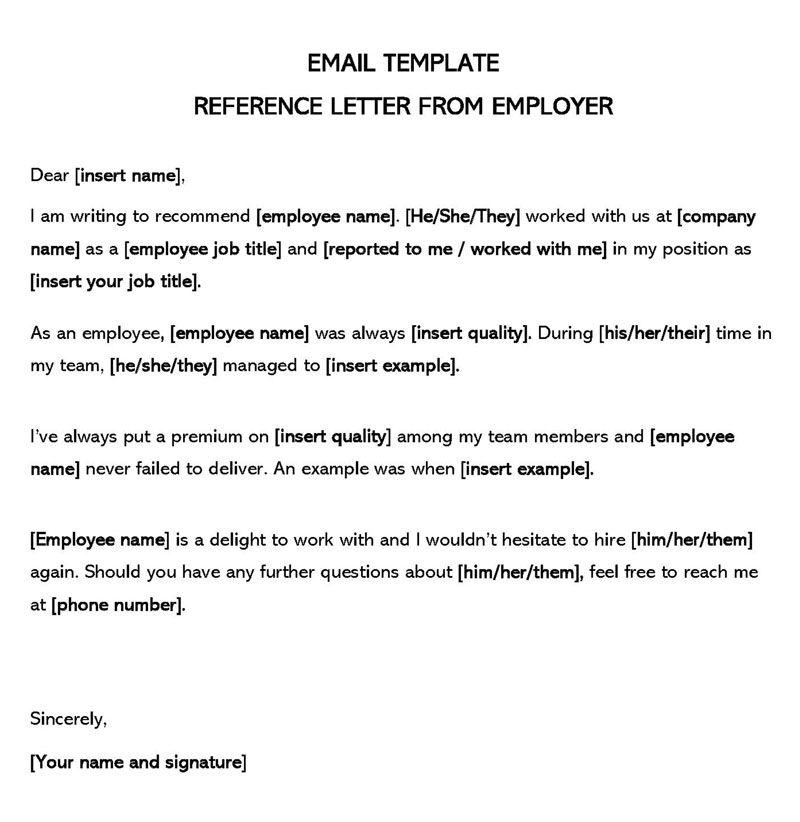
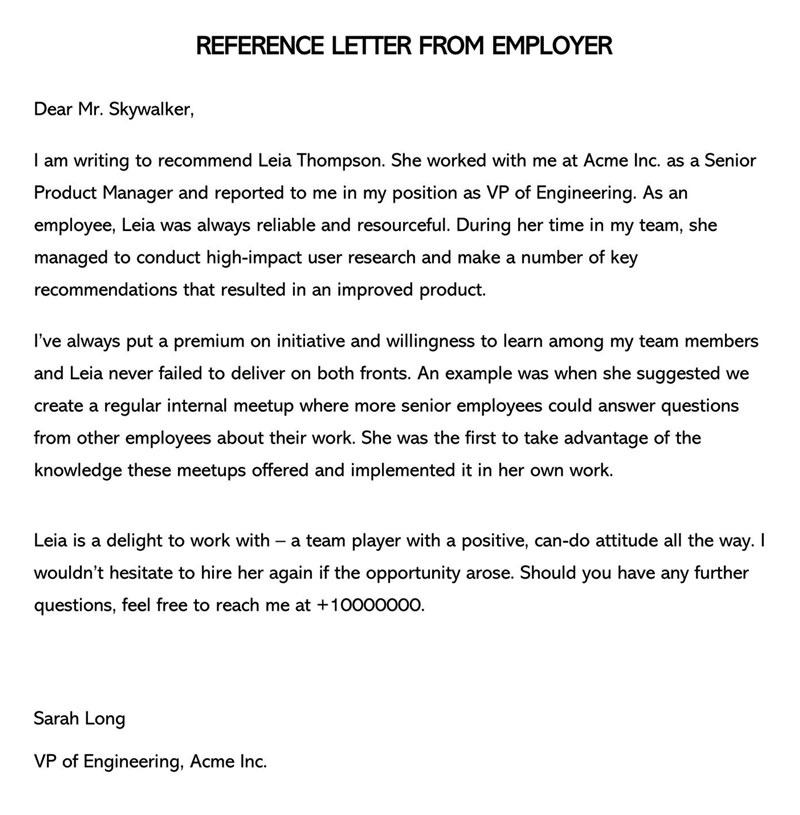
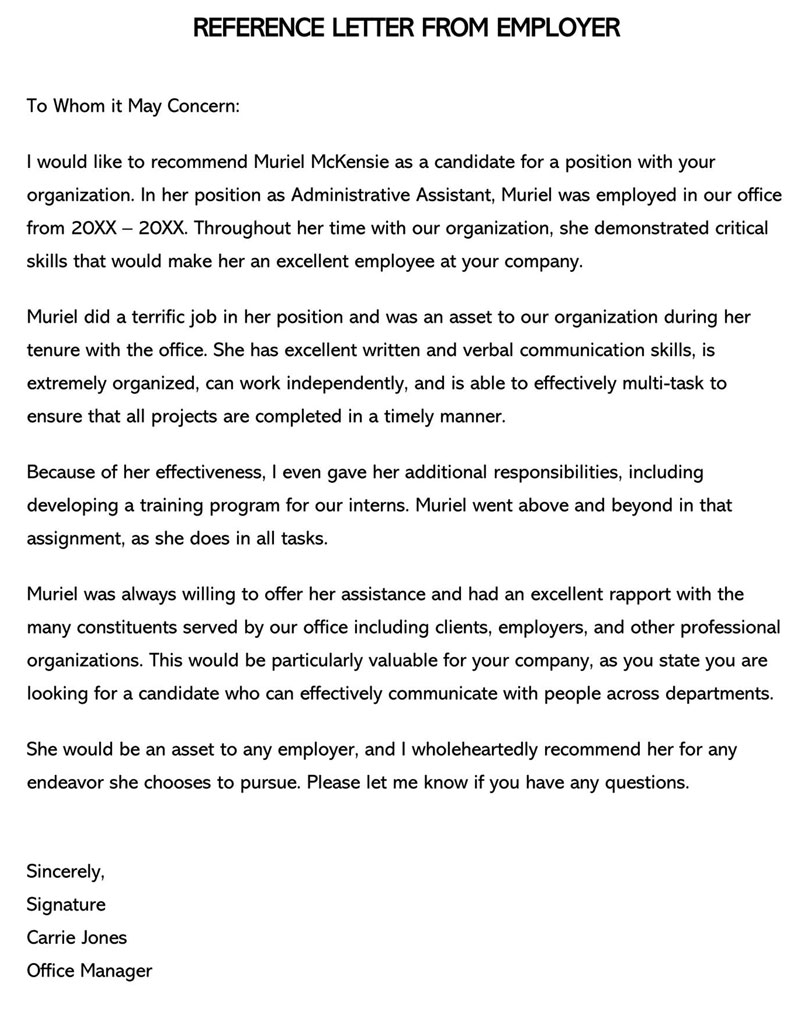
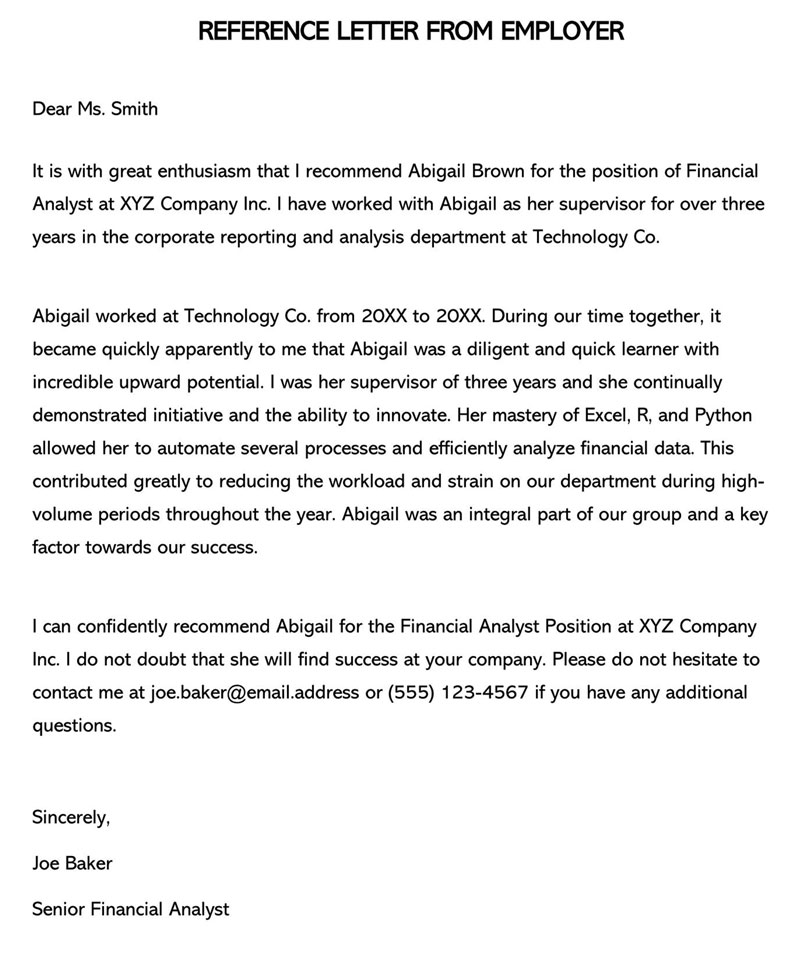
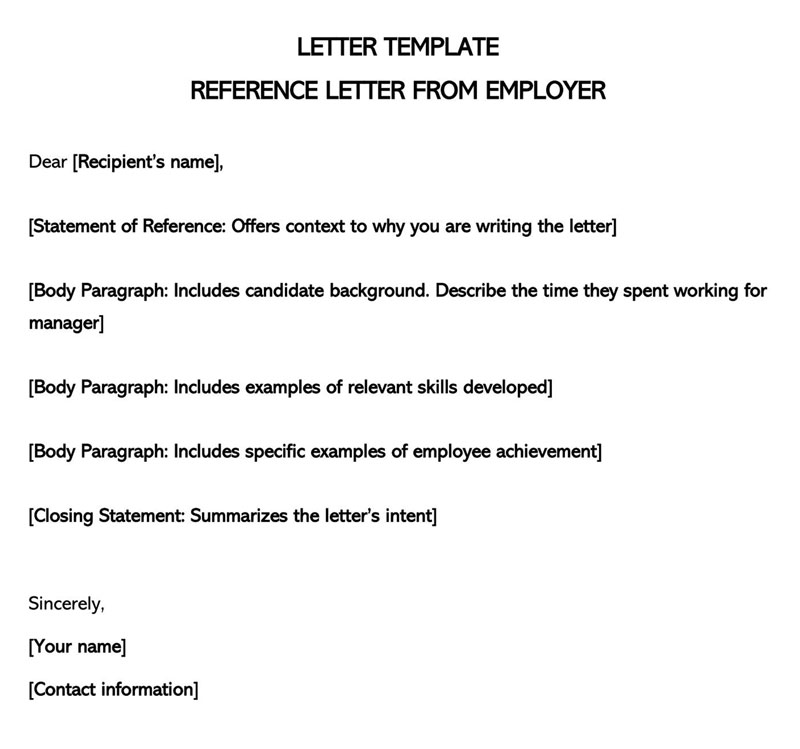
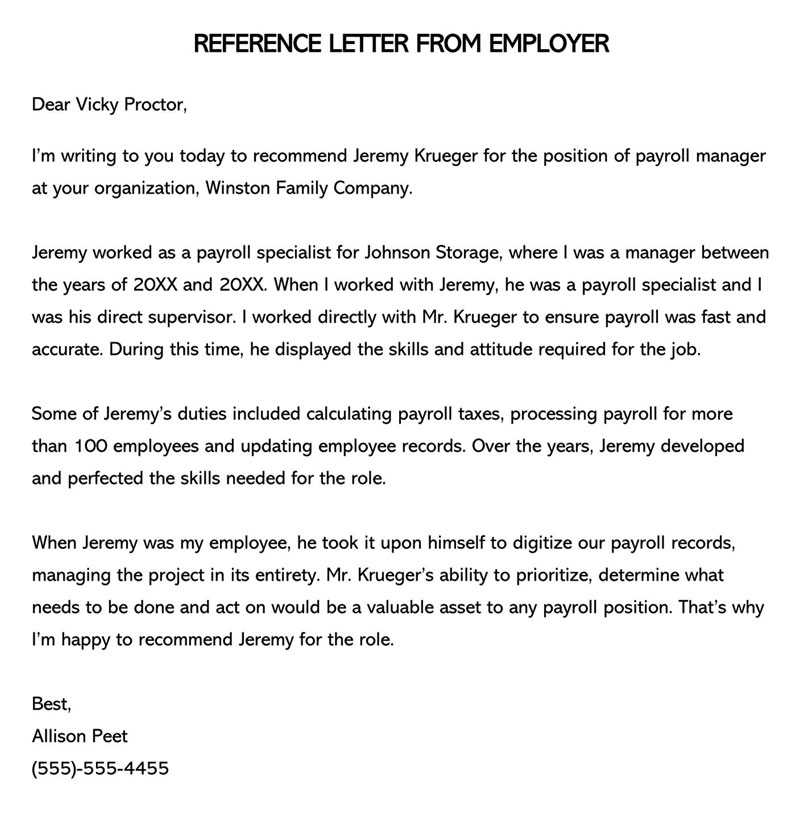
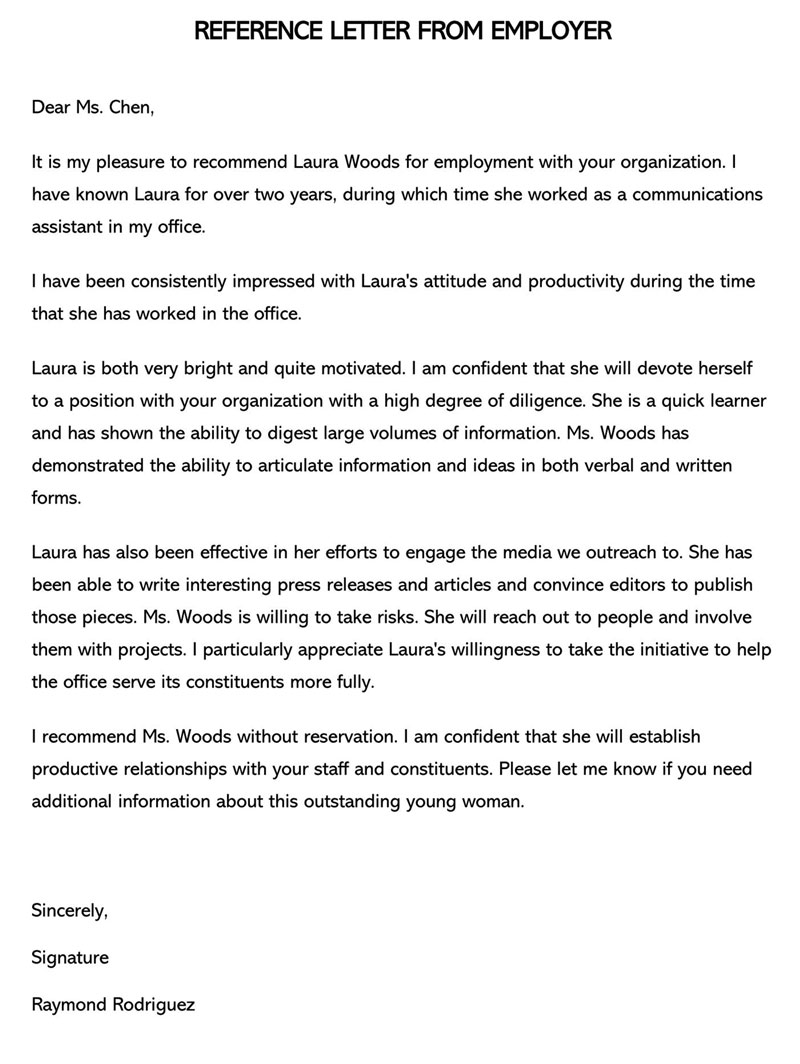
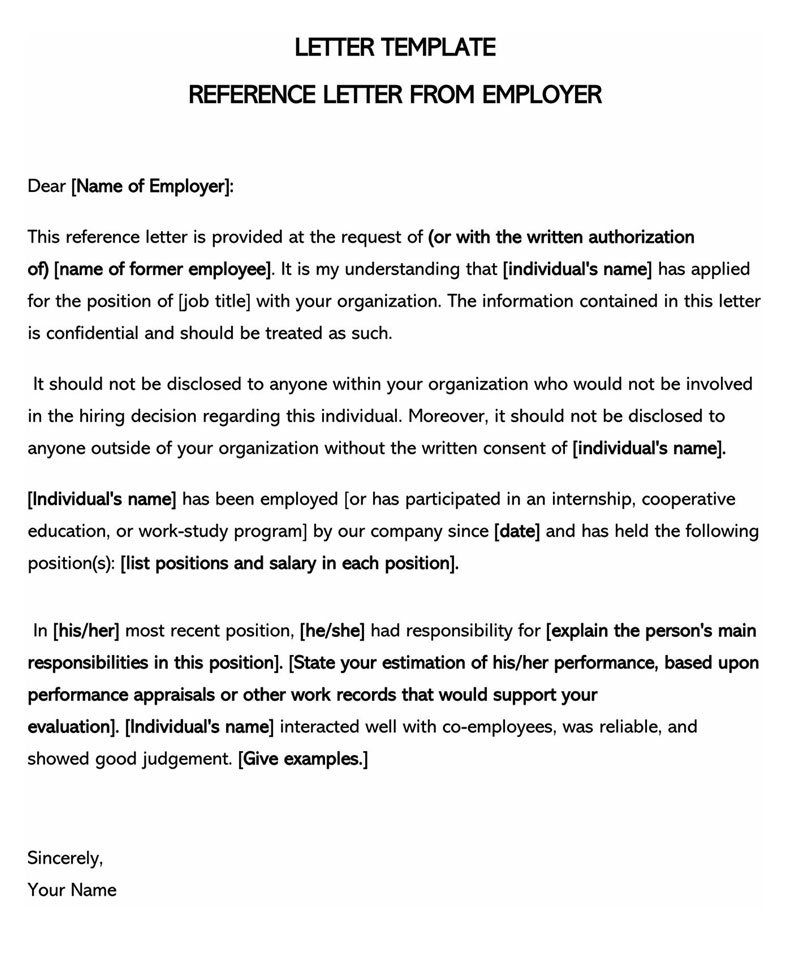
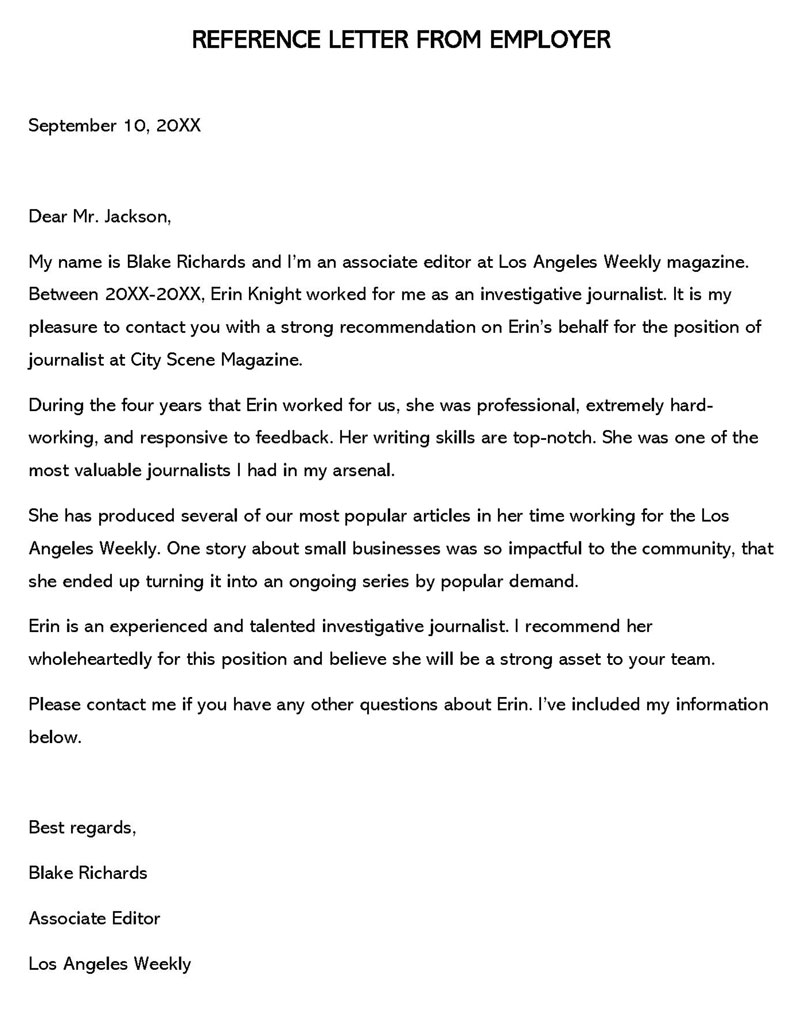
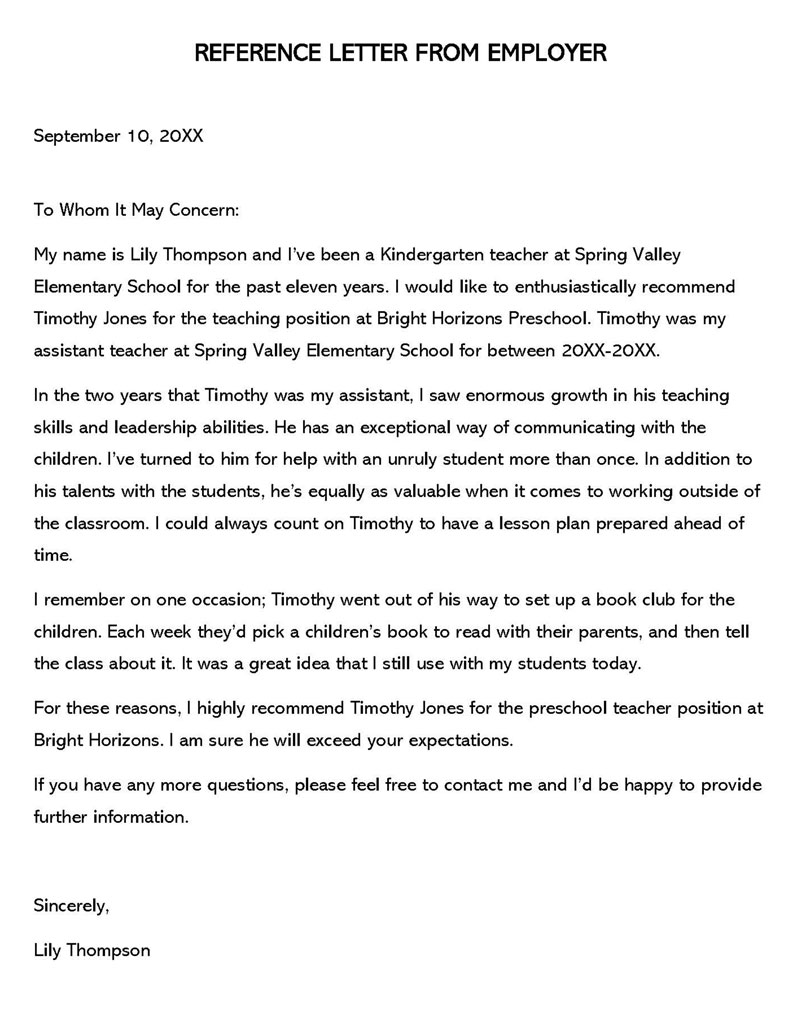
Types of Letters
You can write the letter as an employer for various reasons. The letter’s purpose typically determines the type of letter you will write.
The different types of letters you can write as an employer include:
Employment reference
The most popular type of letter is an employment reference type. This type of letter is written when the employee wants to apply for a job at another company. You can expect to write this letter for current and previous employees who want to seek employment opportunities in other organizations.
This reference can be used in other cases where the employee’s employment status or history must be verified. Examples of such circumstances are when the employee is applying for a loan, a mortgage, or to rent a house. It will outline the designation, employment dates, salary, and noteworthy habits.
Academic reference
An academic reference is written when the employee wants to apply for a university or scholarship program. Such a letter highlights the employee’s skills, passion in the specific field of study, and noteworthy experiences during their tenure at your organization.
Character reference
A character reference letter is written when a third-party assessment of the employee’s personality is needed, particularly when applying for a high-level position. The letter thus has to be written if you have in-depth familiarity with the employee to give an exhaustive and accurate overview of their character.
The Significance of Employers’ Recommendations
The letter’s objective should be to help the individual succeed with their application. The letter from the employer does this in different ways. Firstly, it is a powerful advocate for the employee. It highlights their strengths as a person and employee while also pointing out their past achievements. Having you, a third party, support the employee’s credentials increases their chances of getting hired more than candidates who only present a cover letter and resume.
A reference letter on its own is an indicator of the employee taking extra steps to secure the position they are applying for. This can help the employee stand out from other applicants. It is an account of an employee’s potential from a reliable source—that is, you as someone who has seen it first-hand.
Other than academic qualifications, most employers want to know what an employee brings to the table. This letter from an employer becomes an essential document for highlighting notable professional and personal experiences, relevant personality traits, and work ethics. It adds personality to the employee’s application.
Format of the Letter
Formatting is a vital consideration when writing a reference letter. A business format should be used when recommending a former employee. The fundamental components of a well-formatted letter from the employer to the employee include:
Header
The first section of the letter should be the header. The header should indicate your name, address, date, the recipient’s name, address, and a salutation, or you can use the company letterhead. If the letter is generic, it can be addressed to “Dear Sir/Madam” or “To Whom It May Concern.”
Paragraph 1: Introduction
The next item should be an introduction, where you introduce yourself and the letter’s purpose. The introduction should state your name, position in the company, relationship with the employee, company name, and who you are recommending. Additionally, details such as the position held by the former employee and the length of employment should appear in the introduction.
Paragraph 2: Describe work performance and strengths
This section should give detailed information on why the employee is suitable for the position they are applying for. For example, the paragraph can outline notable work performances/responsibilities, strengths, skills, traits, and reasons why the employee was a valuable asset in their former employment. Again, it would help to focus on the positives but avoid exaggerating or misleading the recipient.
Paragraph 3: Closing
This letter should also have a closing. In closing, you should restate your support for the employee and the reason(s) in brief. You should include your contact information, too, should the recipient want to reach out. A formal sign-off should then be supplied.
pro tip
Ask the employee questions in advance. Proper preparation is imperative when writing a reference letter for a former employee. You can meet with the employee to obtain the necessary information to make a strong recommendation. You should find out the deadline for submitting the letter, the company and position the employee is applying for, the recipient’s name, the most relevant skills to the letter’s purpose, and any information they would like to be prioritized. You can prepare an outline and record the key points of your discussion in bullet points.
Writing It for Employee
Having this letter and writing a solid reference are two distinct but related aspects. However, you shouldn’t regret your decision to agree to recommend an employee. With the steps outlined below, you’re well-equipped as an employer to write a solid and impactful letter:
Relationship with the employee
Begin by stating the nature of your relationship with the employee you are recommending. The nature of your relationship will usually contribute to the credibility of your endorsement. A more professional reference is more valuable than one from a personal acquaintance. You can also mention the length of this relationship.
Dates of employment
The next step is to indicate the dates when the employee started to work for you and their final day of employment. The longer you have worked with an employee, the more detailed and informative a letter to the employee will be. While the length of tenure is essential, do not exaggerate.
Position held
You should then state the position held by the employee in your company. The position does not have to be the exact position the employee is applying for. Sometimes they may be changing careers or getting promoted.
Company name
After that, you should mention the company where the employee held the position mentioned previously. Remember, you may have supervised the employee at another company other than your current place of employment. Hence, it would be best if you were careful not to confuse the two.
Job responsibilities
The letter should mention job responsibilities undertaken by the employee in their previous place of employment. When listing the responsibilities, prioritize the responsibilities relevant to the position or opportunity they are applying for.
Qualifications
Next, you should mention how the employee is qualified for the position. Qualifications are based on completed professional training. Therefore, you can mention any relevant certification, degree, or diploma.
Strengths and abilities
Afterward, it would be best to discuss the strengths and abilities of the employee at the workplace. It would help to tie strengths and abilities to specific experiences where the employee exhibits these qualities instead of listing them. Showing the outcome of applying the skill or ability is more persuasive than listing the skill.
Examples of qualities you can mention include:
- Excellent communication skills
- Effective leadership skills
- Dedicated to their career
- Consistent with the quality of work
Justify your endorsement of the person
The next step is to let the recipient know why you’re endorsing the employee. This can be done through a confident statement of recommendation that declares that the employee is suitable for the job opening based on your assessment.
CTA for follow-ups
After a reassuring recommendation statement, invite the recipient to reach out if they have questions they would like answered. This can be communicated through a CTA (call to action) statement.
Contact information
Lastly, you should provide your contact information at the bottom of the letter. You can provide an email address or phone number after your signature.
Recommendation Letter from an Employer Template
[Your Name]
[Your Position]
[Company Name]
[Company Address]
[City, State, Zip Code]
[Your Email Address]
[Your Phone Number]
[Date]
[Recipient’s Name or “To Whom It May Concern”]
[Recipient’s Position, if known]
[Recipient’s Company/Organization Name, if applicable]
[Recipient’s Address, if known]
[City, State, Zip Code]
Dear [Recipient’s Name or “To Whom It May Concern”],
I am writing to wholeheartedly recommend [Employee’s Name] for [mention the position, opportunity, or field they are pursuing]. As [Employee’s Position] at [Company Name], I have had the pleasure of working closely with [Employee’s Name] for [duration] and have been consistently impressed by their professionalism, skills, and contributions to our team.
[Employee’s Name] joined our team in [Year] as a [Employee’s Job Title], and from the outset, demonstrated exceptional [mention a key quality or skill, e.g., problem-solving ability, leadership, creativity]. During their tenure, [Employee’s Name] was responsible for [briefly describe main responsibilities], where they delivered remarkable results including [mention any significant achievements, projects, or contributions].
One of [Employee’s Name]’s most notable contributions was [describe a specific project or accomplishment]. This project not only [describe the impact of the project, e.g., increased efficiency, saved costs, improved customer satisfaction], but also highlighted [Employee’s Name]’s strengths in [mention relevant skills or qualities, e.g., collaboration, innovation, dedication].
In addition to their professional achievements, [Employee’s Name] has excellent interpersonal skills. They have the ability to work well with team members across different levels of the organization and have always been a source of positive energy and inspiration in our workplace. Their ability to [mention another skill or quality, e.g., communicate effectively, lead by example, mentor junior staff] has been invaluable to our team’s dynamics and success.
[Employee’s Name] is a self-motivated individual who is always looking for ways to improve and take on new challenges. I am confident that they will bring the same level of enthusiasm, excellence, and dedication to any future role or endeavor they pursue.
Please feel free to contact me at [Your Phone Number] or via email at [Your Email Address] should you require any further information or clarification. I would be happy to provide more insights into [Employee’s Name]’s abilities and potential contributions.
Thank you for considering this recommendation. I am confident that [Employee’s Name] will be an outstanding addition to your team or project and I look forward to seeing the accomplishments they will achieve in their future endeavors.
Sincerely,
[Your Signature, if sending a hard copy]
[Your Name]
[Your Position]
[Company Name]
Sample Recommendation Letter from the Employer
To Whom It May Concern,
I am writing to highly recommend Anna Lee for any engineering role, particularly those focused on product development and team leadership. As the Director of Engineering at Innovative Tech Solutions, I had the privilege of being Anna’s direct supervisor from 20XX to 20XX. During this period, Anna demonstrated exceptional abilities in software development, project management, and innovation, making her an invaluable asset to our team.
- Professional Expertise and Technical Skills: Anna consistently showcased her expertise in software engineering, contributing significantly to our product development efforts. Her proficiency in programming languages such as Python and Java, combined with her adeptness at using software development tools, played a pivotal role in streamlining our development processes. Her technical skills were complemented by a deep understanding of software architecture and agile methodology, allowing her to contribute to significant advancements in our products.
- Leadership and Team Collaboration: Anna possesses natural leadership qualities and the ability to foster collaboration among her team members. She led a team of software engineers in developing our flagship project, which resulted in a 40% increase in product efficiency. Her leadership was characterized by a commitment to mentoring junior team members, encouraging professional growth, and promoting a culture of continuous learning and improvement.
- Innovation and Problem-Solving: One of Anna’s standout qualities is her innovative mindset. She has a keen eye for identifying opportunities for improvement and developing creative solutions to complex problems. Her contributions have not only enhanced product functionality but have also led to the filing of two patents in the name of our company.
- Work Ethic and Professionalism: Anna’s dedication to her work is unmatched. She consistently meets deadlines, goes above and beyond project requirements, and maintains a high standard of professionalism. Her exceptional work ethic, combined with her ability to adapt to changing environments, makes her a highly reliable and versatile team member.
Anna’s departure is a significant loss for our team, but I am excited to see the impact she will make in her future endeavors. I am confident that her skills in software development, leadership capabilities, innovative approach, and professional attitude will make her a valuable asset to any organization.
Please feel free to contact me at (555) 678-1234 or via email at thomas.rivera@innovativetechsolutions.com should you require further information. I would be delighted to provide additional insights into Anna’s qualifications and contributions to our team.
Sincerely,
Thomas Rivera
Director of Engineering
Innovative Tech Solutions
Analysis
The sample letter is effective due to its comprehensive structure, clear articulation of the candidate’s strengths, and credible endorsement by the Director of Engineering. The letter begins with a polite greeting and establishes the writer’s authority, lending credibility to the recommendation. It proceeds to highlight the candidate’s professional expertise, technical skills, leadership qualities, and innovative mindset, providing specific examples to support each claim. This specificity enhances the reader’s understanding of the candidate’s capabilities and contributions. Furthermore, the writer’s personal observations and experiences with the candidate add authenticity to the recommendation, reinforcing its credibility.
The letter effectively emphasizes the candidate’s work ethic, professionalism, and adaptability, attributes highly valued in the engineering field. By detailing the candidate’s accomplishments and impact on the organization, the letter convincingly advocates for the candidate’s suitability for future roles. Additionally, the writer’s willingness to provide further information demonstrates accessibility and reinforces the sincerity of the recommendation. Overall, the letter effectively showcases the candidate’s qualifications, strengths, and potential contributions, making it a compelling endorsement for prospective employers.
Tips
Reference letters are highly valued tools in an employee’s application. As the recommender, you should therefore be aiming to write a great letter for your employee.
The tips presented below can help achieve this:
Keep your reference positive
You should write the letter in a positive tone. The letter should reflect the employee’s positive attributes. If you feel you don’t have enough positives to write a strong recommendation, it is best to decline the request to recommend the employee.
Tailor the recommendation to the job
A personalized letter usually has more weight than a generic letter. As the recommender, you should take the initiative to find out why the employee needs the reference. You should then tailor the letter to its specific purpose.
Be confident when writing about the employee
A reference letter should reflect your confidence in the capabilities of the person you are recommending. Any signs of self-doubt can throw off the hiring manager or admissions committee. Remember, it is your professional assessment of the employee’s suitability, and therefore you cannot afford to be neutral; you’re either strongly recommending the employee or not.
Be specific with examples
The use of examples when highlighting skills, traits, work ethics, and experience is highly recommended when writing it for an employee. Examples are taken as substantial evidence of any claims you make.
Be truthful
Always keep it truthful. A dishonest letter can be termed an attempt to mislead the person reviewing the employee’s application, negatively affecting your reputation and the employee’s application. Therefore, you should avoid exaggerating details at all costs.
Frequently Asked Questions
It is not unusual to have a reference letter meant to be written and submitted under specific guidelines. For example, some organizations will have specific instructions for formatting, delivery method, word count, and file format in which the letter should be submitted. Therefore, it is imperative to ask the employee if there are any applicable instructions before writing the letter.
After being asked to write a reference letter from employer to employee, the first step is establishing whether you’re the right person. The fact that the employee worked under your supervision is insufficient justification for accepting the request. Next, you should decide whether you can confidently write a strong recommendation. If not, you can politely decline the request. If you are able and willing to endorse them, you can hold a meeting and collect all the information needed.












